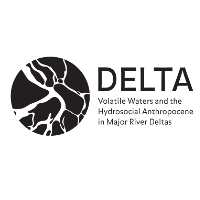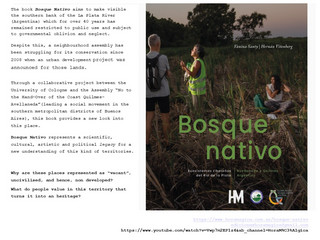This statement, summarising a key motivation for producing this book, comes from Leopoldo Barbieri who delivered a powerful statement on behalf of the Neighbourhood Assembly No to the Handover of the Coast (Asamblea No a la Entrega de la Costa) at the launch of the book Bosque Nativo, which took place at the Global South Studies Center on January 31. The book had been launched first in a public library in Bernal, a neighbourhood of Quilmes in greater Buenos Aires, in December 2022, and was now presented to a German audience.
The full title of the book translates as “Native Forest: Riverine Ecosystems of the La Plata River. Avellaneda and Quilmes, Argentina”. It documents scientific, cultural, artistic and political aspects of the southern bank of the La Plata River in the greater Buenos Aires region. The area has a recent history of restricted access, industrial pollution and government neglect, but also a deeper more diverse past of human habitation, land use and productivity. Above all, the riverside in the municipalities Avellaneda and Quilmes is home to a previously unrecognised biological diversity and wilderness, which is currently threatened by a large-scale, private urban development project. The book aims at making the place and its unique ecology and history visible – so that it can be protected, as Leonardo Barbieri explained.
The book has been edited by Vanina Santy, doctoral candidate in anthropology at the university of Cologne and affiliate with the DELTA project. Her doctoral project studies the conflict over this neglected area on the La Plata River and focuses on the intimate relationships that activists forge with this unique place. At the book launch, Vanina introduced the book and the collaborative practice with the Neighbourhood Assembly that had given rise to it, including the gathering of experts on various aspects, the common drafting of texts and the negotiation of purposes. The photographer Hernán Vitenberg, who had provided original images to the volume, joined the book launch by videoconference and explained his relation to the La Plata Riverside along with the special technique of flash photography to highlight particular aspects in the landscape.
Also Melina Agostini, who works as editor with the Buenos-Aires-based publisher Hora Mágica and has played a key role in the book’s realization, joined by videoconference. She reported how she was amazed by the speed the book came together, fuelled not only by the dedication of the contributors, but also by a feeling that the book had already been written in everyone’s heads: the fifteen years of activism, research and litigation had prepared the Neighbourhood Assembly and its networks well to put into writing what they had been working on for a long time. Then Leopoldo Barbieri spoke, also by videoconference, for the Neighbourhood Assembly. He provided the wider context for the book, which is the struggle to preserve the commons from incessant assaults by an ideological and economic system that is already anachronistic and must not be permitted to destroy the last remnants of what it has not destroyed already. Finally, biologist Elián Guerrero, co-author of a chapter on biodiversity in the book, reported on his research in the area since 2010, noting the unique combination of two biotas on the La Plata Riverside: higher zones portray older species that no longer exist in the surroundings, while lower, wetland zones display rapid changes in plant and animal species. This combination makes the riverside ecology so special.
A special landscape makes for a special book: not only does it combine artistic photography with scientific work and appealing design. It also brings a wonderful place to life for people who do not know it, have never been there, or only know it as a "non-place": an empty, forgotten space that needs to be reinvented entirely in order to gain value, like the private urban development project and its champions suggest. But the contributions to this book show that this place does not need to be reinvented, as it already has its own history, an identity, a vital ecology and a large group of supporters. It is particularly clear that this place does not need to be turned into a utopia of neoliberal urban planning by a profit-oriented company. The arguments of this book identify more than enough traditions, initiatives and legal frameworks that can - and should - be further developed as the basis for a promising future for this place!
The book does not pretend that this place is a paradise, but equally documents its difficult history of pollution, neglect, destruction and decay. But it shows that these tragic events do not have to determine the future of this place, and instead motivate people from very different backgrounds to protect the place and develop its strengths. The commitment of a group of motivated activists is also behind this book, which was produced collaboratively and thus reflects the cooperation of the Neighbourhood Assembly, which has been working for years to preserve and revitalise the coast in Avellaneda and Quilmes. This group makes it possible for people from a wide area to build relationships with the place.
Bosque Nativo demonstrates in an exemplary way the indestructibility of the local, the specific and the grown, which ceaselessly defies the ever-increasing forces of global financial flows, multinational corporations and corrupt governments. We wish this book a broad, interested readership that it will inspire for livable alternatives to the handover of the coast.

